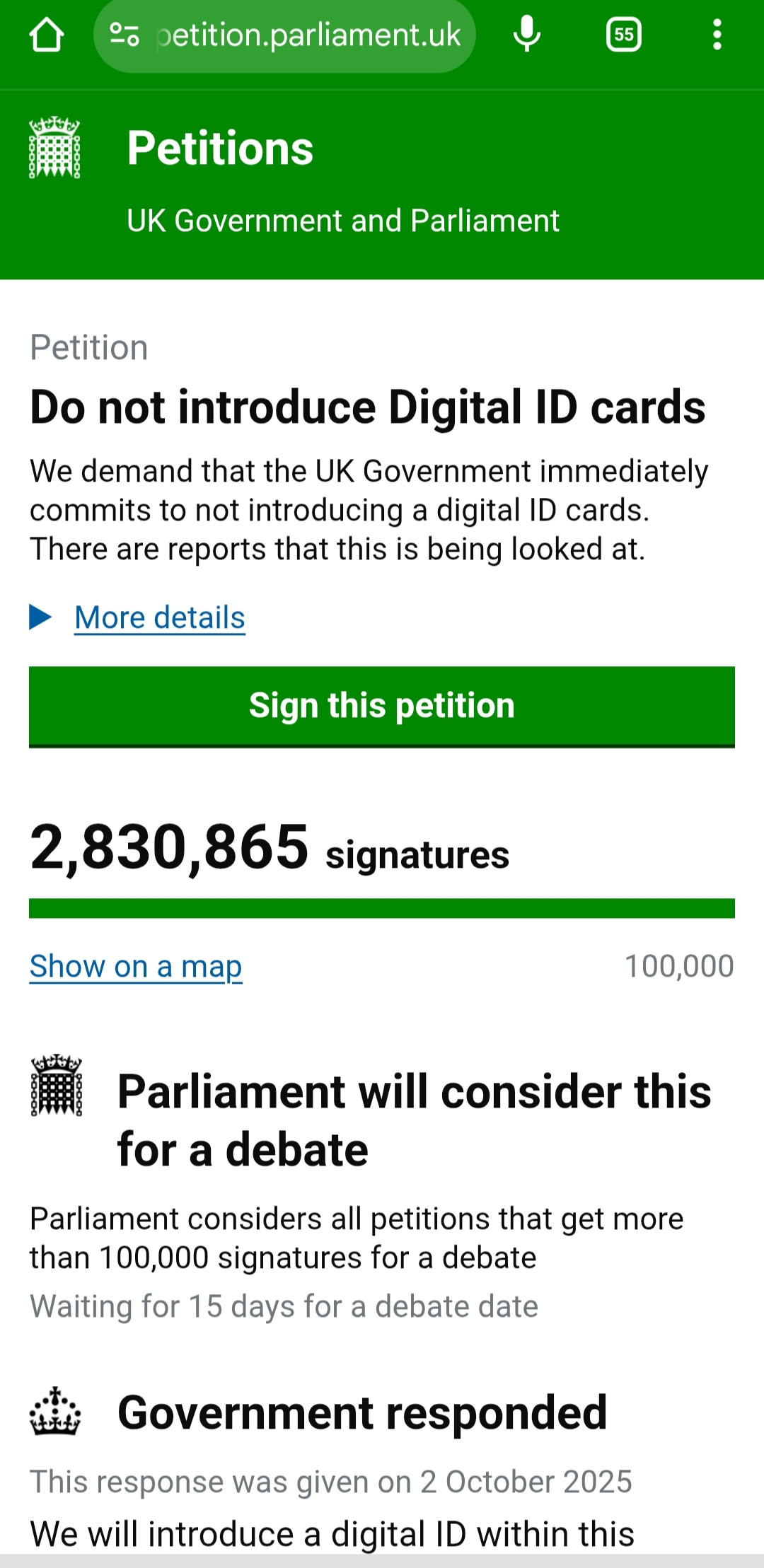Over 2.8 million people have signed a petition demanding that the United Kingdom Government “immediately commits to not introducing digital ID cards.”
The petitioners note that “there are reports that this is being looked at.”
“We think this would be a step towards mass surveillance and digital control, and that no one should be forced to register with a state-controlled ID system. We oppose the creation of any national ID system,” the statement justifying the petition read.
They further noted that “ID cards were scrapped in 2010, in our view for good reason.”

As of the time of filing this report, 2.83 million people had signed the petition addressed to the UK Government and Parliament.
In a related development, a group of British lawmakers has written a strongly worded letter to Prime Minister Rishi Sunak, voicing firm opposition to the government’s reported plans to introduce a compulsory, UK-wide digital identity scheme.
In the letter, signed by 37 Members of Parliament across different parties, the MPs described the proposal as a dangerous step toward excessive government control, warning that it could fundamentally alter the relationship between citizens and the state.
“Dear Prime Minister, we are writing to register our profound and passionate opposition to your reported plans for a compulsory, UK-wide digital identity scheme,” the MPs stated.
The signatories argued that such a move would amount to “an unprecedented level of state control over British citizens.”
They continued: “This is a fundamental change to the relationship between the individual and the state. It’s dangerous, intrusive and deeply un-British.”

The MPs cautioned that implementing digital ID would erode privacy and individual freedoms, saying, “It risks building the foundations of a surveillance state – one that will inevitably expand in scope over time.”
Calling on the Prime Minister to abandon the proposal, the letter further read: “We urge you to abandon these plans immediately. At the very least, you must commit to bringing any proposal before Parliament for full scrutiny and a free vote – and to fully consulting the public before attempting to impose such a drastic measure on a reluctant country.”
Emphasizing widespread public opposition, the lawmakers declared: “The British people do not want this, and the British people do not need this. Compulsory digital ID would mark a dangerous and permanent shift in the balance of power between government and governed. We will oppose it at every stage.”
The letter was signed by prominent MPs including Rupert Lowe, Gavin Williamson, Sir David Davis, Esther McVey, Sir Geoffrey Clifton-Brown, and Sir John Whittingdale.
The joint statement underscores deep unease within sections of Parliament over any move toward mandatory digital identification, amid growing debates about privacy, surveillance, and state overreach in the UK.
In response to various calls for the scheme to be scarapped, the government insisted that it would introduce a digital Identity card.
It said, “We are committed to making people’s everyday lives easier and more secure, to putting more control in their hands (including over their own data), and to driving growth through harnessing digital technology.
“We also want to learn from countries which have digitised government services for the benefit of their citizens, in line with our manifesto commitment to modernise government.
“Currently, when UK citizens and residents use public services, start a new job, or, for example, buy alcohol, they often need to present an assortment of physical documents to prove who they are or things about themselves.”
The UK government stated that the national digital identity system will address issues such as bureaucracy, fraud, illegal working, and modern slavery associated with the current fragmented identification process.
It noted that the absence of a unified system has also excluded many citizens, including about one in ten adults without a photo ID, from accessing essential services.
The proposed digital ID, which will be free for all UK citizens and legal residents aged 16 and above, aims to simplify access to both public and private sector services. While obtaining the digital ID will be voluntary, it will be required for certain applications.
A publication on the United Kingdom government website further reads , “Your free digital ID will be stored securely on your phone and will help to prove your identity, including age and residency status, simplifying access to government services and a range of uses across the private sector.”
“It is expected to be rolled out to all UK citizens and legal residents by the end of this Parliament. It will be free to download and employers will be required to check it as evidence of your right to work in this country. This is to curb the prospect of work for illegal migrants, a significant factor driving small boat crossings,” it further reads.


